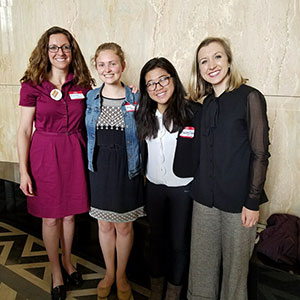
College of Public Health and Human Sciences students recently stepped out of the classroom and into public health advocacy at the Oregon State Capitol.
Members of the student-led Public Health Club took a trip to Salem on April 7 to meet with legislators to discuss important public health issues. Oregon Public Health Association (OPHA) hosts the annual event, which is also part of National Public Health Week.
OPHA provided attendees with information about the law-making process and advocacy training and facilitated a discussion of relevant public health measures before breaking attendees into groups to meet with legislators from their Senate district.
Public Health Club Officer Hannah Tacke and members Emily Baranski and Ashley Chan participated in the event with their advisor and instructor, Aimee Snyder. The women met with Oregon House Rep. Dan Rayfield to discuss House Bill 3276, House Bill 2726 and Senate Bill 558. Tony Lapiz, a CPHHS alum and member of Rep. Rayfield’s staff, and intern Ranteg Sandu, a CPHHS student, were also at the meeting.

Breaking the barriers during outbreaks
Hannah advocated for HB 3276, a bill that would reduce barriers to health services delivered during an infectious disease outbreak. She spoke to Rep. Rayfield about barriers undergraduate students have in navigating their health insurance vaccination coverage, especially for freshmen living their first year away from home.
She told him about recent vaccination clinics on OSU’s campus in an emergency response to an outbreak of meningococcal B, a vaccine-preventable bacterial infection of the lining of the brain and spinal cord. Although Benton County Public Health Department, the Oregon Health Authority and OSU Student Health Services collaborated to offer mass vaccinations clinics on campus, students had to navigate their health insurance to determine if the vaccine was covered.
Hannah provided firsthand descriptions of the barriers students faced when told they would need to pay more than $100 for the vaccination because the emergency clinic was out-of-network.
Coverage for all kids
Emily advocated for HB 2726 and SB 558, companion bills often called “Cover all Kids,” which aim to extend health care coverage for all children whose families are financially eligible for the Oregon Health Plan without requiring proof of residency.
She spoke about the 17,000 children who are without health care coverage in Oregon, highlighting the public health value of health equity to ensure all children can access primary care, rather than endure costly uninsured emergency care.
“This was a great experience, and it was really interesting to see a different side of advocacy,” Emily says. “Knowing my legislators are so approachable really makes change seem possible.”

Advocate for change
Ashley also had the opportunity to speak to the legislators and staff representing her home district in Southern Oregon. She spoke with Rep. Duane Stark and Sen. Herman Baertschiger’s aid about Senate Bill 274, which requires immunizations in post-secondary educational settings. Ashley spoke with Rep. Stark about Cover all Kids and how to make it feasible without federal funding.
“This was a very interesting and eye-opening conversation because I got to see the ‘politicking’ that goes on behind the scenes,” Ashely says. “Overall the experience of getting to meet with these representatives was nerve-wracking but was also very exciting and encouraging.”
The Capitol Visit Day is a free event for public health professionals and students provided by OPHA’s Health Policy and Advocacy committee. CPHHS students were provided transportation to the event by support from CPHHS’s School of Social and Behavioral Health Sciences and a scholarship provided by OPHA’s Health Education and Promotion special interest section.